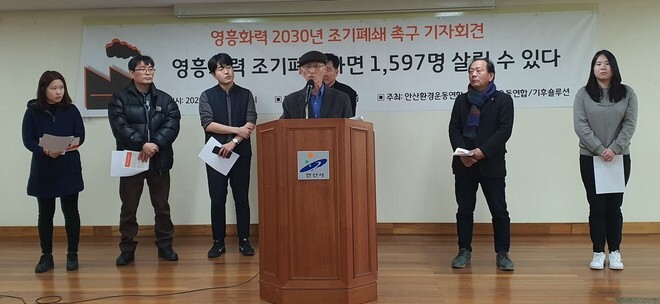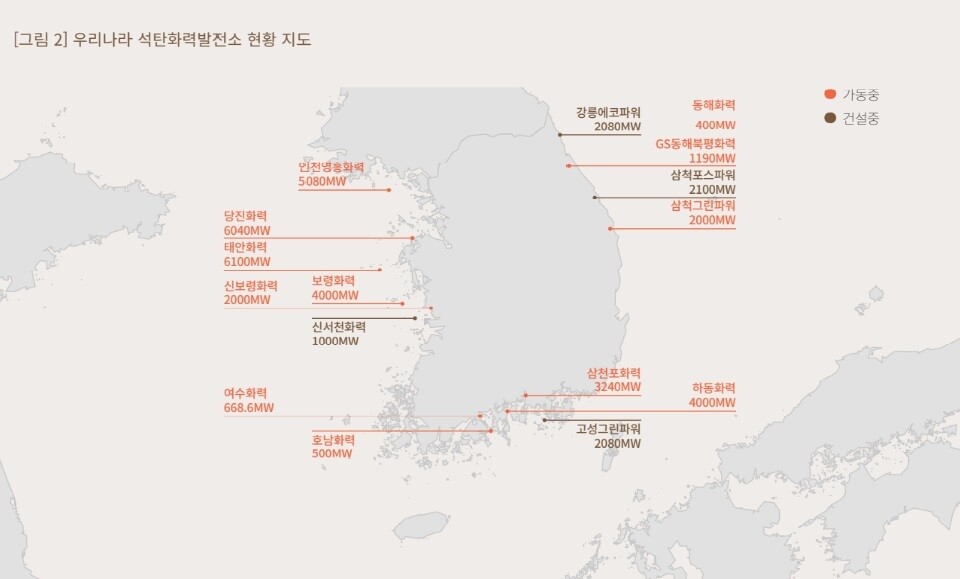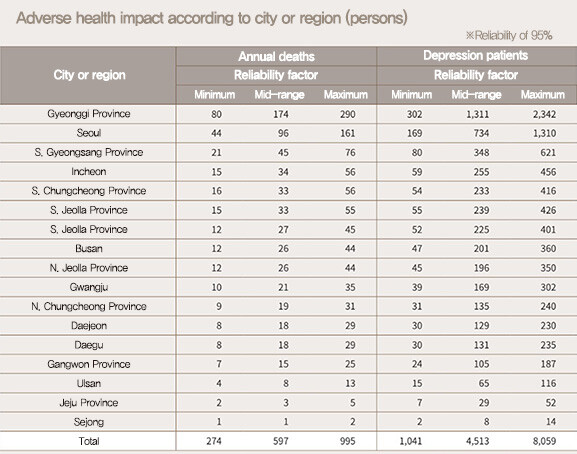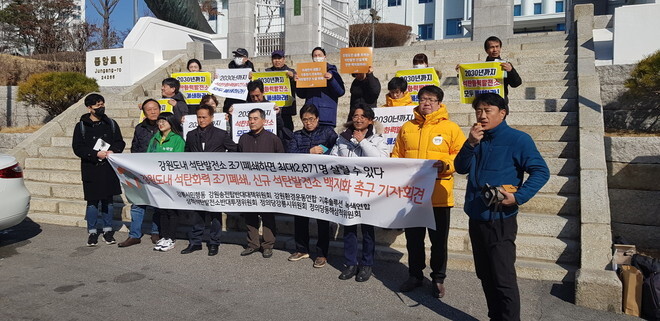hankyoreh
Links to other country sites 다른 나라 사이트 링크
995 S. Koreans a year die prematurely due to coal pollution, a study says

As many as 995 premature deaths occur each year as a result of atmospheric pollution from South Korea’s coal-fired power plants, a study has concluded. The term “premature deaths” refers to individuals predicted to die ahead of their life expectancy due to respiratory ailments and other effects of atmospheric pollution.
On Feb. 18, Solutions for Our Climate (SFOC), a non-profit focusing on climate change-related issues, published a report titled “Coal-Fired Power: Bad Electricity That Steals Lives.” The report concluded that as many as 995 premature deaths -- an average of 2.7 per day -- occur each year due to atmospheric pollution emitted from the 60 coal-fired power plants currently operating in South Korea.

In addition to the premature deaths, the report, which analyzed the potential health benefits of the early closure of coal-fired power plants, estimated up to 8,059 people per year experiencing depression and other psychological damage as a result of the operation of coal-fired power plants. The results were obtained by analyzing the potential health impacts of figures obtained by applying the global “atmospheric dispersion modeling system” to data provided by government institutions and power plants on emissions of atmospheric contaminants such as ultrafine dust, nitrogen dioxide, sulfur dioxide, and sulfuric acid. The method involves calculating the prevalence of respiratory and other ailments by comparing situations with and without atmospheric contaminants resulting from coal-fired power generation.
The report predicted a total of 15,233 premature deaths by the time all of South Korea’s coal-fired power plants have been shut down. The calculation is based on an estimated date of 2054 for the halting of operations at the last coal-fired power plant in South Korea, assuming that all of them are operated only for their 30-year design life according to the guidelines for coal-fired power plant longevity management.
Oh Dong-jae, a researcher for SFOC, attended a press conference held the same day in the briefing room of Ansan City Hall in Gyeonggi Province to call for the early closure of Yeongheung Power Station.
“Assuming the government closes all coal-fired power plants ahead of schedule by 2030, they could potentially prevent a total of 7,153 premature deaths,” Oh said.

The largest number of premature deaths was predicted for Gyeonggi Province at 290, followed by Seoul (161), South Gyeongsang Province (76), Incheon (56), and South Chungcheong Province (56). Explaining the large amount of damage experienced by Gyeonggi and Seoul -- neither of which has coal-fired power plants -- Oh said, “The analysis attributed this to both the high density of population in those reasons and the overlapping effects from coal-fired power plants in Incheon and South Chungcheong, including the Yeongheung, Dangjin, and Taean plants.”
The most heavily impacted area in Gyeonggi Province was Hwaseong (35), followed by Yongin (27) and Anyang (20). In a joint press conference that day by SFOC and the Ansan/Incheon branch of the Korea Federation for Environmental Movements (KFEM), Yuk Jong-ryul, chair of a committee pursuing measures for residents in the area of Yeongheung Power Station, complained of the damages.
“People’s right to a healthy residential environment is being destroyed by coal dust and coal ash that comes in from the power plant,” he said.

The highest prevalence of depression as a result of atmospheric pollution from coal-fired power plants were found in the cities of Suncheon, South Jeolla Province, and Boryeong, South Chungcheong Province, which are subject to overlapping effects from three different plants. The prevalence rate was calculated at one per 5,000 residents. In South Chungcheong, which is home to 30 coal-fired power plants -- fully half of South Korea’s total -- atmospheric contaminants from the plants were found to represent 66.2% of total atmospheric contaminant emissions. The coal-fired power plant calculated as having the largest impact on atmospheric quality was Hadong Power Station in South Gyeongsang Province.
The same day, the South Gyeongsang and Ansand/Incheon branches of KFEM and the group Gangneung Citizen Action all held press conferences to urge the government to shut down all coal-fired power plants before 2030. The 60 coal-fired power plants currently operating in South Korea are responsible for 27.1% of total greenhouse gases and 11% of fine particle dust. Coal-fired power generation accounts for 42% of South Korea’s electricity, with the government currently at work building an additional seven plants.
By Lee Jung-ha, Incheon correspondent, Choi Sang-won, South Gyeongsang correspondent, and Park Soo-hyuk, Gangwon correspondent
Please direct comments or questions to [english@hani.co.kr]
Caption: A coalition of environmental activists call for the government to close all coal-fired power plants by 2030 during a press conference at Ansan City Hall, Gyeonggi Province, on Feb. 18. (Lee Jung-ha, staff photographer)
A coalition of environmental activists and civic groups call for the government to close all coal-fired power plants by 2030 during a press conference in front of the Gangwon Provincial Office on Feb. 18. (Park Soo-hyuk)
G

Editorial・opinion
![[Column] Has Korea, too, crossed the Rubicon on China? [Column] Has Korea, too, crossed the Rubicon on China?](https://flexible.img.hani.co.kr/flexible/normal/500/300/imgdb/original/2024/0419/9317135153409185.jpg) [Column] Has Korea, too, crossed the Rubicon on China?
[Column] Has Korea, too, crossed the Rubicon on China?![[Correspondent’s column] In Japan’s alliance with US, echoes of its past alliances with UK [Correspondent’s column] In Japan’s alliance with US, echoes of its past alliances with UK](https://flexible.img.hani.co.kr/flexible/normal/500/300/imgdb/original/2024/0419/2317135166563519.jpg) [Correspondent’s column] In Japan’s alliance with US, echoes of its past alliances with UK
[Correspondent’s column] In Japan’s alliance with US, echoes of its past alliances with UK- [Editorial] Does Yoon think the Korean public is wrong?
- [Editorial] As it bolsters its alliance with US, Japan must be accountable for past
- [Guest essay] Amending the Constitution is Yoon’s key to leaving office in public’s good graces
- [Editorial] 10 years on, lessons of Sewol tragedy must never be forgotten
- [Column] A death blow to Korea’s prosecutor politics
- [Correspondent’s column] The US and the end of Japanese pacifism
- [Guest essay] How Korea turned its trainee doctors into monsters
- [Guest essay] As someone who helped forge Seoul-Moscow ties, their status today troubles me
Most viewed articles
- 1[Column] The clock is ticking for Korea’s first lady
- 2Hong Se-hwa, voice for tolerance whose memoir of exile touched a chord, dies at 76
- 3After 2 months of delayed, denied medical care, Koreans worry worst may be yet to come
- 4[Column] Has Korea, too, crossed the Rubicon on China?
- 5Samsung barricades office as unionized workers strike for better conditions
- 6US overtakes China as Korea’s top export market, prompting trade sanction jitters
- 7All eyes on Xiaomi after it pulls off EV that Apple couldn’t
- 8[Guest essay] How Korea turned its trainee doctors into monsters
- 9[Editorial] As it bolsters its alliance with US, Japan must be accountable for past
- 10[Correspondent’s column] In Japan’s alliance with US, echoes of its past alliances with UK